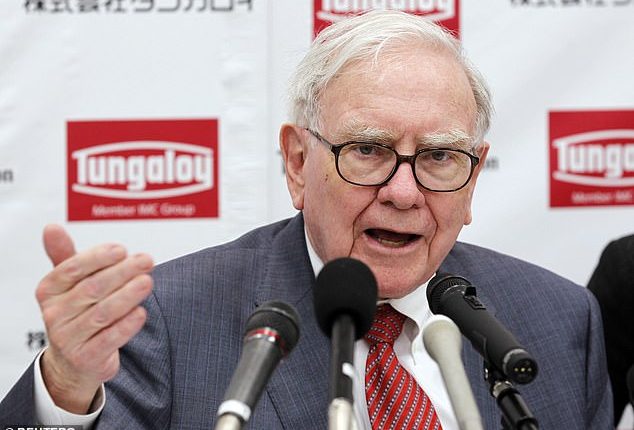Japanese stocks surged after billionaire Warren Buffett said Berkshire Hathaway would increase its stake in them.
In his annual letter to shareholders at the weekend, the 94-year-old said he plans to increase holdings in five Japanese trading houses – Itochu, Marubeni, Mitsubishi, Mitsui and Sumitomo.
Shares in the trading houses – which run diverse collections of businesses, much like Berkshire does – were up more than 5 percent Tuesday after Buffett’s stamp of approval.
Mitsubishi led the charge, soaring 7.5 percent, while the other four each gained more than 5 percent.
Buffett first said he had invested in the firms in 2019, but had capped Berkshire’s ownership stakes below 10 percent.
But in his latest letter on February 22, Buffett announced the trading houses had agreed to ‘moderately relax’ the limit. He noted that the companies ‘very successfully operate in a manner somewhat similar to Berkshire itself.’
Known as ‘sogo shosha,’ Japanese trading houses run businesses spanning from overseas oil and gas production to salmon farming and TV shopping.
Since Buffett’s initial investment, these companies have outperformed Tokyo’s Nikkei 225 – a stock index composed of Japan’s top 225 blue-chip companies.

Japanese stocks rallied after billionaire Warren Buffett said Berkshire Hathaway would likely increase its ownership in them
The Nikkei was down 1.57 percent on opening Tuesday. Markets were closed on Monday due to a public holiday.
Berkshire’s investment in the trading houses totaled $23.5 billion at the end of 2024.
The company has spent $13.8 billion on its current holdings and expects $812 million of dividend income in 2025, Buffett said in the letter.
Buffett’s interest ‘is proof that the trading company sector, including our company, is highly valued,’ Marubeni told Bloomberg in an emailed statement.
‘Trading houses are trading at well below their peak now, so Buffett probably sees this as a chance to buy more,’ Norikazu Shimizu, an analyst at IwaiCosmo Securities Co, told Bloomberg.
‘With Trump’s presidency and lots of changes to tariff policies, the market is uncertain, but trading houses are involved in a wide range of business, so Buffett likely sees them as a safe bet.’
The easiest way for Americans to buy shares of companies like Mitsubishi is with one of the big brokerages like Fidelity, Charles Schwab, or Interactive Brokers, which offer access to international stock markets.
Investors with those accounts can buy shares directly on the Tokyo Stock Exchange, which in the case of Mitsubishi is under the ticker 8058.T.
Most of the app-only platforms like Robinhood do not offer direct access, but investors can buy an exchange-traded fund (ETF) which track Japanese stocks.

Mitsubishi Corp soared following the news of Berkshire’s investment

Buffett (pictured on a trip to Japan in 2011) began buying shares in five major Japanese companies in 2020, and said earlier this month in his annual shareholder letter that he intends to increase investments in the nation

Since Buffett’s investment in the trading houses was announced five years ago, they have outpaced Tokyo’s Nikkei 225

European stocks have hugely outpaced Wall Street in the month since President Donald Trump took office
Bret Kenwell, eToro US Investment Analyst, told DailyMail.com: ‘Regardless of how investors approach ownership in Japanese equities, they should do their own due diligence and analysis beyond buying just because Warren Buffett’s Berkshire Hathaway firm has done so.’
US stocks have faltered in recent days, amid concerns around Donald Trump’s tariff plans, sticky inflation and a potentially slowing economy.
The S&P 500 fell 0.8 percent on opening Tuesday, putting the index on track for its fourth consecutive losing session.
The most recent consumer confidence survey from research organization the Conference Board came in much lower than expected, signaling how consumers are becoming pessimistic about the US economy.
European stocks have also hugely outpaced Wall Street in the month since President Donald Trump took office.
This is an embarrassing blow to the President, who has often boasted about how the stock market sees bumper gains when he is in the White House.
The strong performance of European stocks has been driven, in part, by Trump’s decision not to impose immediate tariffs on the European Union.
The US President has threatened to impose sweeping tariffs on Mexico and Canada and has placed an additional 10 percent duty on imports from China.
Uncertainty around potential tariffs on two of America’s largest trading partners, which are currently due to come in early next month, has spooked some investors.







